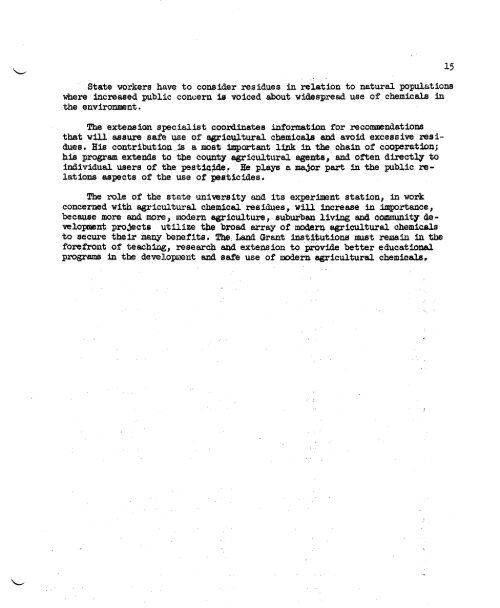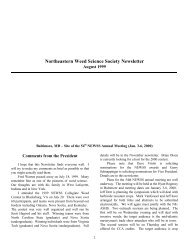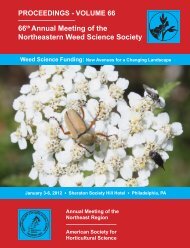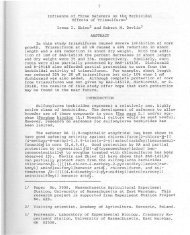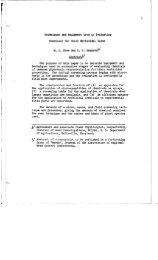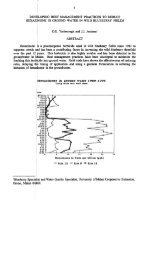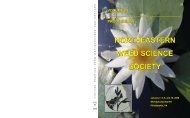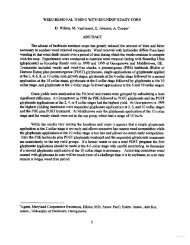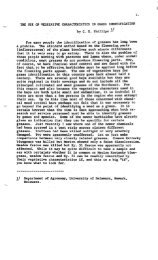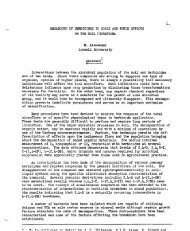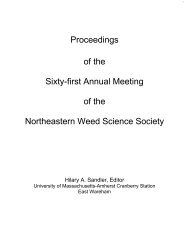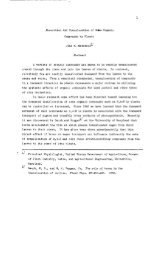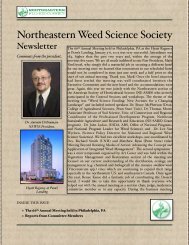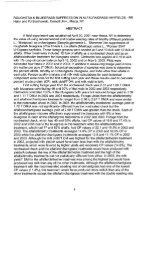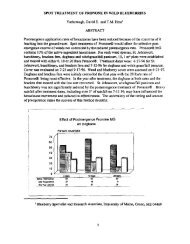- Page 1 and 2: PRESENTANDFUTtJU OF AQUATIC'. WIlD
- Page 3 and 4: Complete reports from 12 Nor~heaste
- Page 5 and 6: The reawakening in aquatic weed con
- Page 7 and 8: ,10.1ng -2,4.,;iD (19), 2,4~5.T (4)
- Page 9 and 10: 9 The Role of the State in Res idue
- Page 11 and 12: ,., 1'4 keep developmental work in
- Page 13: In addition to a review of field an
- Page 17 and 18: The vigorous regrowth of quackgrass
- Page 19 and 20: during t,he sUllllller.is l,ower ll
- Page 21 and 22: 5. llslapon and other chlorine,ted
- Page 23 and 24: 23 • ·i INTRODUCTION: !!'he Bear
- Page 25 and 26: Some damage to runners rssul ted fr
- Page 27 and 28: 27 CELLSTRUCTUREANDPLANTGROWTHCRMON
- Page 29 and 30: pel'fQ.,..d,-.ear17M1932. that the
- Page 31 and 32: a copious precipitate deposits afte
- Page 33 and 34: B) A general review of the subject
- Page 35 and 36: This narrative of ineptitude must b
- Page 37 and 38: does Jo run a recreational facility
- Page 39 and 40: Another pote1U:ialuse for chemicals
- Page 41 and 42: Newapproaches in the use of herbici
- Page 43 and 44: 43 sentence would bear this out". T
- Page 45 and 46: More and more each year since the a
- Page 47 and 48: 11. Rice, E. J. The effects of cUlt
- Page 49 and 50: PFSI'ICIDESUSED - - - - - - - - - -
- Page 51 and 52: __..:I whether or not these apparen
- Page 53 and 54: Dosage. Ib./acre Dimethyl tetrachlo
- Page 55 and 56: ~ ~_~ __ L L Table 2. Weed Susceoti
- Page 57 and 58: - - - - - - - - ~, - - - - --- - -
- Page 59 and 60: Table 7.. Weed Control in :l:!c,Ql1
- Page 61 and 62: Table '1. Rat.1lISstI 'Of carrot an
- Page 63 and 64: H , 'ta~l!. g,._~e~_O!~ut~• .:.:.
- Page 65 and 66:
65 plant press and dried in a f~ced
- Page 67 and 68:
67 Tablet. 'lIi! EFFECT'or AN'INO'l
- Page 69 and 70:
69 THE INFLUENCE JIt P.I!ll'ROLEUM
- Page 71 and 72:
71 1 CDEC(Ee) 2 " " 3 4 " 5 " " 6 7
- Page 73 and 74:
!a~l~ 1._ ~!:.c!: :!!1~hJl!:e.::m~d
- Page 75 and 76:
75 EFFECT;OFCOMPOSITIONANDVOLUMEOF
- Page 77 and 78:
A LOGARITHMICSPRAlERFORSMALLPLCflSY
- Page 79 and 80:
79 Do~ Calculations The actual init
- Page 81 and 82:
Selective Herbicides for Several Cr
- Page 83 and 84:
83 Susceptible weeds Tolerant weeds
- Page 85 and 86:
85 Marion Market 9 9 9 9 9 9 9 9 Da
- Page 87 and 88:
Table 5. Bai
- Page 89 and 90:
weeding of Lima Bean. With Chemical
- Page 91 and 92:
EFFECTOF HERBICIDESONQUALITYANDYIEL
- Page 93 and 94:
Results Date treated: 9/6/61 Soil m
- Page 95 and 96:
95 Date planted: 915/61 Date treate
- Page 97 and 98:
Table 3. Yield Data on Hanover and
- Page 99 and 100:
Weeding of Carrots With 'pre-lilanU
- Page 101 and 102:
101 WEEDCONTROLSTUDIESIN SEElED ONI
- Page 103 and 104:
Weather conditions at the two locat
- Page 105 and 106:
In contrast to the damage noted in
- Page 107 and 108:
107 Literature Cited 1. Althaus. R.
- Page 109 and 110:
Table 1. Weed control: stand of pla
- Page 111 and 112:
Results and Discussion. The data, p
- Page 113 and 114:
CIPO, Vegadex, and Randox Singly or
- Page 115 and 116:
Table 1•. Wa. control, stand of p
- Page 117 and 118:
'Ihree experiments were conducted i
- Page 119 and 120:
a- Table 2_"COIIlpartsonof' Several
- Page 121 and 122:
fJ Table 3. CcBparison of Several.
- Page 123 and 124:
c
- Page 125 and 126:
Table 1. Seeding and Weed Counts on
- Page 127 and 128:
WEEDCONTROLANDTHE IMPROVEMENT OF SE
- Page 129 and 130:
Following emergence of the tomato s
- Page 131 and 132:
indicates that several of the treat
- Page 133 and 134:
DISCUSSIONOF RESULTS Transplant Tom
- Page 135 and 136:
harvest was covered with weeds, and
- Page 137 and 138:
An additional 2 years of tests on f
- Page 139 and 140:
~ Table 2 .--l Average Number and P
- Page 141 and 142:
~ Table 4 Total Yields in Number an
- Page 143 and 144:
"" ~ Table 6 Bvalu~t1.on of S&l~nto
- Page 145 and 146:
of weed eoneee I without inj ury 't
- Page 147 and 148:
1. Associate Research Specialist in
- Page 149 and 150:
Stulllll&ry A study was lh1tlatedto
- Page 151 and 152:
Table 2. The residual effects of se
- Page 153 and 154:
FURTHEROBSERVATIONS ONCONTROL OF TH
- Page 155 and 156:
Table 3 - Mean per cent brake contr
- Page 157 and 158:
lAssociate Research Spec1alist in W
- Page 159 and 160:
PRE-E~mRGENCE WEEDCONTROLTEST IN RE
- Page 161 and 162:
161 Table 2. Tolerance of Beets and
- Page 163 and 164:
163 Results generally were good wee
- Page 165 and 166:
USE OF GRANULAR CHl!H[CALAPPLICATOR
- Page 167 and 168:
u.s. #1 potatoes and weed control e
- Page 169 and 170:
0' ~ Table 2. Pre-emergent weed con
- Page 171 and 172:
Table 3. Post-hilling weed control
- Page 173 and 174:
~/Pe.nt>:r lITn. h.7(L T1o:oTl.,:r+
- Page 175 and 176:
In table 2 are presettted weed a*1'
- Page 177 and 178:
Since rec1root is only one of the I
- Page 179 and 180:
w.l.th 3 and 4 Ibs. ot Randox per a
- Page 181 and 182:
181 CONTROLOF ANNUALWEEDSIN pOTATOE
- Page 183 and 184:
The following comments on the vario
- Page 185 and 186:
185 S\:U!U!1fryand ConclWtlon No he
- Page 187 and 188:
187 Table 2. Potato YIelds Followin
- Page 189 and 190:
Residue analysis of potatoes treate
- Page 191 and 192:
soil temperatures at the time the m
- Page 193 and 194:
( ( ~able 2. Effect of Several Che~
- Page 195 and 196:
195 PROBLEMSIN THEAPPLICATIONOF HER
- Page 197 and 198:
197 scale tests on 2 cOlJllllercial
- Page 199 and 200:
l!!!! Experiment A factorial experi
- Page 201 and 202:
frOlll plot. at .horter i*nalt (~ t
- Page 203 and 204:
6.50 Table 1. Effe,ct of p"e- an
- Page 205 and 206:
205 EVALUATION0It' DACTHAL * HERBIC
- Page 207 and 208:
The 1959 and 1960 replicated field
- Page 209 and 210:
209 TABLEII Average Weed Cont~l Exh
- Page 211 and 212:
Where the weed eompleJl;conststs of
- Page 213 and 214:
...... 1.67, 213 Table 1. Effect of
- Page 215 and 216:
215 Table 2. Bffect of pre-plant he
- Page 217 and 218:
.217 Pive pre-plant herbicide. were
- Page 219 and 220:
219 Table 1. Effect of pre-p1anthel
- Page 221 and 222:
Table 2. tilat' of pre-plantbftb.tc
- Page 223 and 224:
l EVALUATIONOF THREEHERBICIDESONPnE
- Page 225 and 226:
TABLE2. TIll HIGHESTlATEOFHERBICIDE
- Page 227 and 228:
Because of the lush growth of quack
- Page 229 and 230:
Table 2. Effects of Herbicides on Q
- Page 231 and 232:
Table 3. Effects of Herbicides on A
- Page 233 and 234:
233 The inhibitory activity was ass
- Page 235 and 236:
non-polar solvents. Table 5 shows t
- Page 237 and 238:
237 Figure I Bioassay of cbrOlll4to
- Page 239 and 240:
239 Weed Control and Residual Effec
- Page 241 and 242:
Rototilling was done in June·' SO
- Page 243 and 244:
243 in the spring of 1961 preceedin
- Page 245 and 246:
WEEDCONTROL.AR
- Page 247 and 248:
Li£erature Cited 1. Chappell. W. E
- Page 249 and 250:
Tl'eatments ghing un.811~!8facto%'y
- Page 251 and 252:
Table 1. Designa t ion Am1l:)en .\
- Page 253 and 254:
Table 3. Percent Broadleat Weed Con
- Page 255 and 256:
,255 CONTROLOF ANNUALWlmDSIN swDT C
- Page 257 and 258:
of Casoron per acre was statistical
- Page 259 and 260:
~.-! _ 1.37 ~ Table 2. Sweet Corn Y
- Page 261 and 262:
Table 4. Peroent Control ot Ann.ual
- Page 263 and 264:
EVALUATIONOF FIVE _~p>I!:S FOR KILL
- Page 265 and 266:
265 STRAWBERRY HERBICIDEINVESTIGATI
- Page 267 and 268:
267 Table 2. Eftect Of'herbicidet~e
- Page 269 and 270:
'h ", 4. Tillam lOG at 5 lb/A a.i.
- Page 271 and 272:
Asparagus The results of weed contr
- Page 273 and 274:
273 TABLEII. ~1EED CONTROLANDYIELD
- Page 275 and 276:
~ C'l TABLE tv. lIEE» OON1T..OLAND
- Page 277 and 278:
WEEDCONTROLIN TRANSPLANT TOMATOES (
- Page 279 and 280:
279 ·QUACKGRASSCONTROL S.M. Raleig
- Page 281 and 282:
281 table II. The control of:'4oaek
- Page 283 and 284:
no cultivation during the growing s
- Page 285 and 286:
SummaryandConclu.1Qp' 1. A quackgra
- Page 287 and 288:
If or where farmer acceptance of a
- Page 289 and 290:
,~, ~ Tab1.e II. Chemical. Treatmen
- Page 291 and 292:
so11 per plot at each sampling date
- Page 293 and 294:
418' 293 Table III Main Eff,ects of
- Page 295 and 296:
Table V, }nt ...... e..• ,fa~, I;
- Page 297 and 298:
plots showed smaller decreases with
- Page 299 and 300:
FURTHEREVALUmONor HERBICIDESFal· W
- Page 301 and 302:
301 In the SUIIIIIlf)1' seeding, th
- Page 303 and 304:
The results were similar to those o
- Page 305 and 306:
In another experiment, loam soil wa
- Page 307 and 308:
apparently due to severe competitio
- Page 309 and 310:
ab1e 2. Average dry weight of corn
- Page 311 and 312:
311 The most strllt~Mrr~ct. ~fiIIJI
- Page 313 and 314:
313 RE9lfm'$~lfI)DI3CtlSSION '1.",
- Page 315 and 316:
315 LrrERATURECITED 1. Fertig, Stan
- Page 317 and 318:
.~ pattern following applications o
- Page 319 and 320:
Ratings at the time of'gJ;Vllst; al
- Page 321 and 322:
THERESPONSEOF NUTGRASS TO HERBIC~I)
- Page 323 and 324:
'\.......- TABLE2. Ratings of Nutgr
- Page 325 and 326:
All treatments produced si~1f~c~tly
- Page 327 and 328:
A 327 WEBDe
- Page 329 and 330:
. Eli'FECTSali' WEEDSON YIELD AND"G
- Page 331 and 332:
Pollen Maturity: ",l. ,. Broadleaf
- Page 333 and 334:
'--' The applicators were tested un
- Page 335 and 336:
335 Figure 1. The effeetof partic1e
- Page 337 and 338:
337 SRFeader 1 On this spreader onl
- Page 339 and 340:
Table 4. The effect of speed, p~~cl
- Page 341 and 342:
Table 1: Herbicidal treatments used
- Page 343 and 344:
·000 .000, I II ! WEEDCONTROLRATIN
- Page 345 and 346:
2.5000 CORNINJURY EXPRESSEDAS SQUAR
- Page 347 and 348:
347 1. 2. Danielson. l , ;4. L. Ef~
- Page 349 and 350:
',-- 34~ 3-(3 ..4-Dichlorophenyl)-1
- Page 351 and 352:
weed control with adequate safety t
- Page 353 and 354:
Untreated Table 2. Directed Post-E"
- Page 355 and 356:
.s .... __ Table 7. Pre-Emel'ae~eWe
- Page 357 and 358:
experiment is reported herE!. Trifl
- Page 359 and 360:
Results are given. in Table 4~J'Rot
- Page 361 and 362:
In Princeton fine sand, tritlupalin
- Page 363 and 364:
Included in the lima. bean test wer
- Page 365 and 366:
Table 1. The Effects ofS8veral form
- Page 367 and 368:
Table 3. The effects of several for
- Page 369 and 370:
369 Table 5. The effects of sev~ral
- Page 371 and 372:
• ~ : .• \ • ' -' ..,,:- ',-"
- Page 373 and 374:
Heights of barley were significantl
- Page 375 and 376:
Table 2. The effe,cts of s~\I'~ral
- Page 377 and 378:
Table 4. 377 The effects of aevel8.
- Page 379 and 380:
,:' A PROGRESSREPORTONCOMIo!ERCIAL
- Page 381 and 382:
4. Undesirable dead stem.,lio not r
- Page 383 and 384:
areas under service conditionsa~ va
- Page 385 and 386:
We ,prpbablyhave no speeie of g~owt
- Page 387 and 388:
control. At the end of the third ye
- Page 389 and 390:
initial defoliation was evident lat
- Page 391 and 392:
OBJECTIVE In 1958 an experiment was
- Page 393 and 394:
Replicates DlO 810 I 2.0 0.5 II 1.5
- Page 395 and 396:
DISCUSSION One Year After Applicati
- Page 397 and 398:
1. Button, E.F. Bndwrfg'h~';J .L. ,
- Page 399 and 400:
399 The treatment consisted of appl
- Page 401 and 402:
401 FIELD PROCEDURES Although. the
- Page 403 and 404:
403 In the light of these data it a
- Page 405 and 406:
405 ...·1!MLE I SAMPLECHARACTERIST
- Page 407 and 408:
407 , '.". '.·',',~'l~rL,i;'. "\"
- Page 409 and 410:
dltterent l"atespacaoreand"~"at thr
- Page 411 and 412:
411 RESULTS ireatmentettect was det
- Page 413 and 414:
, 413 ;. ' "1 ' "':j " • made wit
- Page 415 and 416:
( ( . Table 3. Effectiveness on Spe
- Page 417 and 418:
417 FENURQlt,A PROMISINGNEWTOOL FOR
- Page 419 and 420:
There are a number of reaso~ for un
- Page 421 and 422:
.n_ots, "'hhin a few months after:
- Page 423 and 424:
sater method ot tree-killing close
- Page 425 and 426:
Material ~izone is a,mixedf~g.. t w
- Page 427 and 428:
427 On November 16, 1961, at the en
- Page 429 and 430:
CHBMI-THINNINGWITH,AIrlINES IN THED
- Page 431 and 432:
These tests show once aaaiJithe nee
- Page 433 and 434:
Th:Ls ch!~ca1. tx'eatme:n1!_1IhClJ.
- Page 435 and 436:
: if.. . ' A Comparative Study of t
- Page 437 and 438:
'j 437 petioles, now elongated,f'or
- Page 439 and 440:
Helisoma, Menetus, fhYSa andValvata
- Page 441 and 442:
i s. The benth1c populat1Q~ W¥", O
- Page 443 and 444:
443 Eurasian. wa~lfoil a W8t.f~~ ap
- Page 445 and 446:
Empb4sis was on testing DOD-volatil
- Page 447 and 448:
447 . , , -. I':'V'est~a.ti
- Page 449 and 450:
FIELDOBSERVATIONS UPONESTUARINE ANI
- Page 451 and 452:
more than 2 feet. ExceptionalUdes s
- Page 453 and 454:
TABLE1. Responseof oysters t~ diffe
- Page 455 and 456:
In the'Dundee Creek series. ,one of
- Page 457 and 458:
workers. springer (1961) cite8& num
- Page 459 and 460:
OBSERVATIONSONTHE OCCURRENCE' ANDPE
- Page 461 and 462:
461 TABLE! Chemical Water QuaU1?::r
- Page 463 and 464:
TABLEIII Threshold Taste and Odor C
- Page 465 and 466:
(1.1-) Burttschell, R.H. , et al.,
- Page 467 and 468:
Code A - seeded June 29 B - seeded
- Page 469 and 470:
SUIIIIJ~, ~ Conclusions 5' 469 The
- Page 472 and 473:
III. Average turf scores l' of thre
- Page 474 and 475:
474 PIft'J'OTOXICBlFBQTS'QJe'CBRTAI
- Page 476 and 477:
476 MERIONBLUEGBASS• T!BATANDsgD
- Page 478 and 479:
478 In general. the treatments appl
- Page 480 and 481:
4BJ days follow:lng the ohemical tr
- Page 482 and 483:
') ') ' :_B!.ue~s•. Fescue au:l~"
- Page 484 and 485:
:". ',J P~E~ C!',. O~.C~G~S 'F.~HEM
- Page 486 and 487:
Lima and ferd'1izer applications sh
- Page 488 and 489:
4es 1'.o~~1ty, ", .ewf!r''''rsenc.
- Page 490 and 491:
} ) Table 1. Besu):ta.Qf 1961 pre-e
- Page 492 and 493:
492 corresponding plots on este.bl1
- Page 494 and 495:
494 ae.u!s,'I!IIDi,cua.:Lon leUllll
- Page 496 and 497:
496 D±!3pa,~n~ Resul te)I? .,l-ta,
- Page 498 and 499:
498 1 . 1 J. E. Gallagher and n. J.
- Page 500 and 501:
500 Da1;ejJ01 e~uations ~,a.;t'ollC
- Page 502 and 503:
502 TADLEIt Comparison of "severalc
- Page 504 and 505:
504 TADLE3: Pre-oemergence and poet
- Page 506 and 507:
506 Table 1. Re8eeding Resulte:afit
- Page 508 and 509:
5"8 d1propalin ortrifluralin 'at ':
- Page 510 and 511:
510 aUlIPIl iri '-1: ' D" "" Diphen
- Page 512 and 513:
Fall ve. spriif ~nts .. 'Ibe",obl1.
- Page 514 and 515:
514 ~ Tab1e2. Cr&bgraS$'Contr01 in
- Page 516 and 517:
516 ,';1:".i'"'f'!r": :~,j i: .. r
- Page 518 and 519:
. ~lS residual cemtrol of crabgrssi
- Page 520 and 521:
520 - . \.. ; ."," ,
- Page 522 and 523:
5~2 'rab4t13.· ~gtnc. ·QGabtiol:o
- Page 524 and 525:
524 PRE.._RGENCE AMU' POsT-EHERGENC
- Page 526 and 527:
526 Table 1. 'l'a):lsra,. ContrO.k1
- Page 528 and 529:
528 Pre- andpost ..emergejljCec:rab
- Page 530 and 531:
530 Prior to each chemical applicat
- Page 532 and 533:
u 532 3) Those trea.t,mellts which
- Page 534 and 535:
Table I (Coot'd) 27. JSc.F,~iOe t$~
- Page 536 and 537:
536 EXPERIMENTS ONTHECHOOCALCOIm'l)
- Page 538 and 539:
~______ , 53S Table 1: Control of c
- Page 540 and 541:
54' In a similar po st-ell1~rgence
- Page 542:
542 da~hal and diphenatrile) at ear
- Page 545 and 546:
.. ";' -:' il; JT!.: .'\ i~'J" ; ~J
- Page 547 and 548:
541 Distr:tbution of radioacti~tl t
- Page 549 and 550:
549 •RESULTS The distribution of
- Page 551 and 552:
GRAPHII: Comparison of the~.tl;'i~u
- Page 553:
"-...-.. J.4 The distribution of r~


